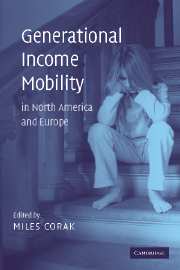Book contents
- Frontmatter
- Contents
- List of figures
- List of tables
- List of contributors
- Preface
- 1 Generational income mobility in North America and Europe: an introduction
- 2 A model of intergenerational mobility variation over time and place
- 3 Equal opportunity and intergenerational mobility: going beyond intergenerational income transition matrices
- 4 Intergenerational mobility for whom? The experience of high- and low-earning sons in international perspective
- 5 What do trends in the intergenerational economic mobility of sons and daughters in the United States mean?
- 6 Changes in intergenerational mobility in Britain
- 7 Intergenerational mobility in Britain: new evidence from the British Household Panel Survey
- 8 Non-linear patterns of intergenerational mobility in Germany and the United States
- 9 Family structure and labor market success: the influence of siblings and birth order on the earnings of young adults in Norway, Finland, and Sweden
- 10 New evidence on the intergenerational correlation in welfare participation
- 11 Intergenerational influences on the receipt of unemployment insurance in Canada and Sweden
- 12 Unequal opportunities and the mechanisms of social inheritance
- Index
- References
7 - Intergenerational mobility in Britain: new evidence from the British Household Panel Survey
Published online by Cambridge University Press: 22 September 2009
- Frontmatter
- Contents
- List of figures
- List of tables
- List of contributors
- Preface
- 1 Generational income mobility in North America and Europe: an introduction
- 2 A model of intergenerational mobility variation over time and place
- 3 Equal opportunity and intergenerational mobility: going beyond intergenerational income transition matrices
- 4 Intergenerational mobility for whom? The experience of high- and low-earning sons in international perspective
- 5 What do trends in the intergenerational economic mobility of sons and daughters in the United States mean?
- 6 Changes in intergenerational mobility in Britain
- 7 Intergenerational mobility in Britain: new evidence from the British Household Panel Survey
- 8 Non-linear patterns of intergenerational mobility in Germany and the United States
- 9 Family structure and labor market success: the influence of siblings and birth order on the earnings of young adults in Norway, Finland, and Sweden
- 10 New evidence on the intergenerational correlation in welfare participation
- 11 Intergenerational influences on the receipt of unemployment insurance in Canada and Sweden
- 12 Unequal opportunities and the mechanisms of social inheritance
- Index
- References
Summary
In this chapter, we analyse the degree of intergenerational mobility in Britain using a data source that has never been used before for this purpose: the British Household Panel Survey (BHPS) for the period 1991–99. Examination of this issue is, at present, limited by the short life of the survey – indeed, the first wave of data of the BHPS was collected in 1991. Nonetheless, such data allow us to make two distinct contributions. The first is substantive and refers to a better understanding (and measurement) of social mobility in Britain for a large sample of individuals from several cohorts and different backgrounds. This can be achieved by employing a measure of socio-economic position that is commonly used in sociology, the Hope–Goldthorpe score of occupational prestige. The results from this analysis are interesting in their own right, and may help integrate the findings that have emerged from sociology and economics in the recent past. The second contribution is methodological, and suggestive of the potentials that the BHPS offers for future research in this and related areas. This goal is achieved by matching parents to their young adult children who are in the labor market, and allows us to examine mobility using measures of economic position that are more conventional for economists, such as earnings and income. Although the estimates are far from conclusive, they are suggestive of avenues for future research.
- Type
- Chapter
- Information
- Generational Income Mobility in North America and Europe , pp. 147 - 189Publisher: Cambridge University PressPrint publication year: 2004
References
- 13
- Cited by



